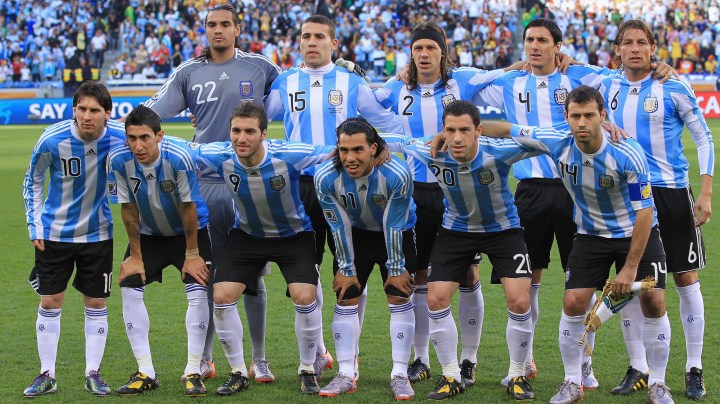Hackers Name Five Argentines Among Those Given Exemptions for Banned Substances During World Cup

The Argentina team line up ahead of the 2010 FIFA World Cup South Africa Quarter Final match between Argentina and Germany.
Russian hackers Fancy Bears first sent shockwaves through the sports world in September of last year, when they released the medical data of dozens of Olympic athletes. On Tuesday, the collective turned its eye to the soccer world, with some bombshell reports regarding the use of banned substances, as well as the reveal of hundreds of failed doping tests.
With this newest release of medical files believed to be hacked from the World Anti-Doping Agency (WADA), it’s been revealed that five Argentina soccer players, including Carlos Tevez, Juan Sebastián Verón, Walter Samuel, and Gabriel Heinze, received therapeutic use exemptions (TUEs) to utilize otherwise banned substances during the 2010 World Cup.
TUEs are basically doctor’s notes that permit the use of banned substances to treat medical conditions. Tevez, Verón, Samuel, and Heinze all declared the use of the banned substance, Betamethasone, which is used to treat inflammation, perhaps of the sort that soccer players get during a month-long tournament. In Tevez’s particular case, it’s possible that he used the topical cream to treat his scars, which were a result of third-degree burns from when he was a child (he was accidentally scalded with boiling water). The other Argentinian player, Diego Milito, was cleared to use the same medicine, as well as Formoterol, Salbutamol, and Budesonide.
The other big reveal from this Fancy Bears info dump is that, in 2015, there were 160 failed tests by soccer players, including 3 in the United Kingdom for cocaine, and one for ecstasy. Of those 160 failed tests, there was no indication that the tests came from top-flight players, however.
None of the organizations or players involved have released statements concerning the matter yet, and since the TUEs made the usages legal, it’s unlikely that there will be any punishment for any of the players named in the leak. However, this could just be the first part of Fancy Bears’ unveiling, and it’s possible that there will be more information leaked soon that has more nefarious contexts. Only time will tell if this was a one-off, or if it’s a coordinated effort to leak confidential medical records by the Russian hack group.